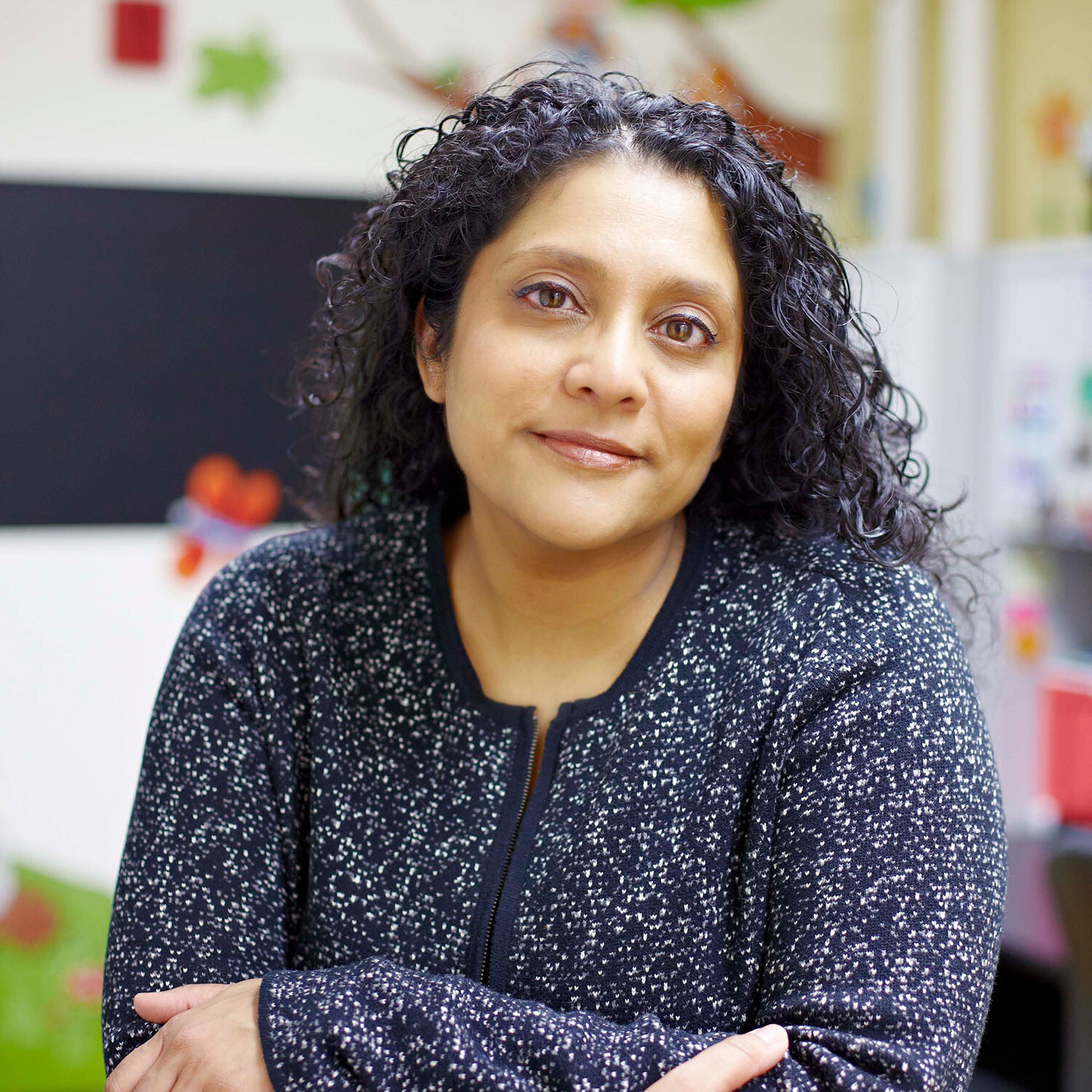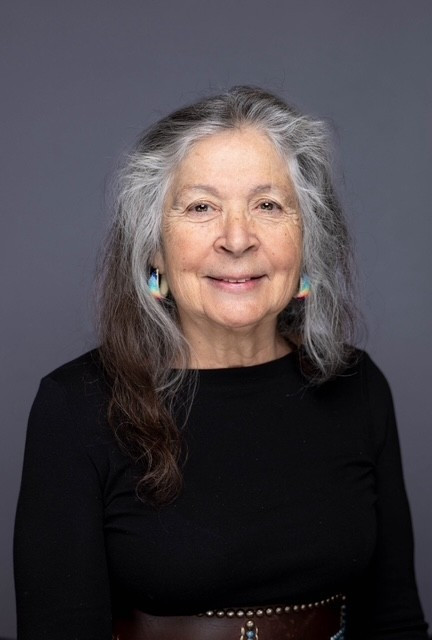Dr. Rebecca Pillai Riddell, CPsych, FCAHS
Nominated Principal Investigator, DIVERT Mental Health | Professor, Psychology, York University | Tier 1 York Research Chair in Pain and Mental Health

Dr. Pillai Riddell is the Tier 1 York Research Chair in Pain and Mental Health and Director of the Opportunities to Understand Childhood Hurt Laboratory (OUCH Lab) in the Department of Psychology of York University in Toronto, Ontario, Canada. She is also a registered clinical psychologist, licensed to work with children and adults in clinical and health psychology. As both a basic-behavioural scientist and a clinician-scientist, Dr. Pillai Riddell currently leads a multi-national, multi-million dollar research program that studies preterm infants and their parents in Neonatal Intensive Care Units. Her research programs ultimately seek to advance a transdimensional understanding of infant pain (cortical, cardiac, behavioural, and social) and support applications of this understanding for real clinical practice. Her research is funded by all three national Canadian research councils (Canadian Institutes of Health Research, Natural Sciences and Engineering Research Council, Social Sciences and Humanities Research Council). She has also been involved extensively in supporting EDI initiatives in research contexts at both the institutional and federal levels. She is the founding director of the POLARIS training collaboration to teach academics how to adjudicate faculty for awards and jobs inclusively and is the Nominated Principal Investigator for DIVERT Mental Health.
Dr. Lori Wozney, PhD
Sun Life Chair in Youth Mental Health | Assistant Professor, Department of Psychiatry, Dalhousie University | Scientific Lead, Integrated Youth Services Nova Scotia

Lori Wozney, PhD, is the Scientific Lead for Mental Health and Addictions (IWK), Adjunct Professor in the Department of Psychiatry (Dalhousie) and Affiliated Scientist at the Centre for Research in Family Health. Her role in IYS-NS is to help build a bold, uplifting, clear, ethical, and inclusive vision for research across IYS-NS.
She has advanced degrees in Educational Studies and Human Performance Technology (Concordia University) and a Post-Doctoral Fellowship in Psychology (IWK). Her ability to bridge disciplines has sparked diverse research collaborations and publications in fields across psychiatry, psychology, computer-science, community health, nursing, social work, emergency medicine, and implementation science. Her work has improved equitable access to mental health services, advanced the way we co-design health interventions with youth and reimagined the way we teach health care providers about the role of socio-historical context in mental health.
Lori currently leads multiple national and international grant funded research and policy initiatives and is an invited speaker and senior advisor. She is co-leading Nova Scotia’s five-year IYS- Learning Health System research project and is a Principal Applicant on the Pan-Canadian Digital, Inclusive, Virtual, and Equitable Research Training in Mental Health Platform (DIVERT). She has been a subject matter expert on youth mental health service standards in multiple provinces. She led a provincial team at Nova Scotia Health that was awarded the Quality Award of Excellence in 2022. Her work in digital mental health has been promoted by the Mental Health Commission of Canada and eMental Health transnational implementation platform in North – West Europe (eMEN).
Dr. Patricia Lingley-Pottie
President and CEO of Strongest Families Institute | Assistant Professor, Department of Psychiatry, Dalhousie University | Scientist, IWK Health Centre

Dr. Patricia Lingley-Pottie is co-founder of the Strongest Families Institute (SFI) and SFI’s proprietary digital health platform, IRIS. She is President and CEO of SFI, Assistant Professor in the Department of Psychiatry at Dalhousie University and a Scientist at the IWK Health Centre. Dr. Pottie has more than 35 years of pediatric nursing experience with expertise in research methods, scale development and the conduct of randomized clinical trials. The past 25 years have been focused on psychological research, specifically harnessing the advantages of technology to deliver accessible and timely distance, evidence-based interventions to children, youth, adults and families. Dr. Pottie has published 37 articles and editorials. As the leader of SFI and IRIS, Dr. Pottie has scaled SFI’s virtual, universal system of stepped-care across Canada, translating it from research into service delivery, in both official languages. SFI’s app is fully interoperable with all programs and certif7ed by MHCC and ORCHA. Dr. Pottie has also been part of several international research projects, translating SFI programs to Finland and Vietnam. She has been nationally recognized for her groundbreaking contributions to mental health innovation, her accolades include the prestigious Governor General’s Innovation Award, the Dalhousie Aurum Award, the Council of the Federation for Innovation in Mental Health and Addictions Award, eMHIC Leadership Excellence Award, the Queen Elizabeth II Platinum Jubilee Medal, 2013 Ernest C. Manning Principal Encana Award for Social Innovation and the 2012 Mental Health Commission of Canada Award for Social Innovation, along with multi-year awards for the Top 50 CEO, Atlantic Business Magazine.
Maureen Abbott
Director, Innovation, Mental Health Commission of Canada

Maureen Abbott is a Master’s-educated Director and Certified Health Executive (Canadian College of Health Leaders) with the Innovation team at the Mental Health Commission of Canada (MHCC). Her work focuses on policy and research and e-mental health. She bridges people, systems, and technology to develop and implement evidence-informed tools, resources and strategies to improve mental health and substance use health outcomes across Canada. Maureen works closely with the lived experience councils at the MHCC and is the Chair of the MHCC’s E-Mental Health Collaborative. Maureen has extensive experience with the not-for-profit health sector and has a background in standards and accreditation. Maureen led the development of national and international networks and is experienced with operations, strategic planning, and quality improvement. Maureen is a CHIEF Executive member with Digital Health Canada.
Sissi Zhao & Aeris Wren
Executive Director & Administrative Director, Fluent in Minds


Sissi Zhao and Aeris Wren are part of the Core Leadership for Fluent in Minds Society, a youth-led non-profit dedicated to improving the accessibility of mental health information for non-English speaking communities through translation. Both youth with lived experiences navigating the mental healthcare system, they decided to tackle the cultural and language barriers they faced from a grassroots initiative, with other passionate youth from across Vancouver.
With 14+ languages in pilot and over 10k+ words translated, Fluent in Minds continues to grow with support of partner institutions, other grassroots organizations, and a dedicated group of community volunteers at its heart. The organization’s founding story has been covered by bilingual newspapers, such as The La Source, and simultaneously seeks to increase awareness about these forgotten barriers amongst communities. Outside of this work, Sissi loves exploring the city, and Aeris enjoys feeding their many pets.
Dr. Venkat Bhat, MD, MSc, FRCPC, DABPN
Associate Professor of Psychiatry, University of Toronto | Lead, AI & Analytics; Lead, Digital Interventions & Intelligence Group | Director, Interventional Psychiatry Program, St. Michael’s Hospital

Dr. Venkat Bhat is an Associate Professor of Psychiatry at the University of Toronto, where he directs the Interventional Psychiatry Program, leads AI & Analytics at iBEST, and serves as lead of the Mental Health Community of Practice for T-CAIREM. His work advances AI in mental health, spanning digital therapeutics, LLM conversational agents, and multi-agent AI systems. Dr. Bhat has published over 170 peer-reviewed papers and delivered more than 200 presentations, establishing himself as a national leader in AI-enabled psychiatry. He is building a pan-Canadian and global community of practice at the intersection of AI and mental health, as well as AI applied to the interface of mental health and medical illness. His research integrates computational psychiatry, neurostimulation, and psychopharmacology with AI to personalize treatment and improve outcomes. His work has been recognized with numerous awards, including 2025 Emerging Leader (Digital Health Canada) and the 2024 Leadership Award (RCPSC).
Dr. Guillaume Dumas, PhD
Associate professor, Faculty of Medicine, Université de Montréal | Principal investigator, Precision Psychiatry and Social Physiology laboratory, Centre hospitalier universitaire (CHU) Sainte-Justine Research Centre

Guillaume Dumas is Associate Professor of Computational Psychiatry in the Faculty of Medicine at the Université de Montréal and Principal Investigator of the Precision Psychiatry and Social Physiology Laboratory at the CHU Sainte-Justine Research Center. He holds the IVADO Professorship in AI for Mental Health and is an academic member of Mila – Quebec Artificial Intelligence Institute. Recognized as a CIFAR Azrieli Global Scholar in Brain, Mind, and Consciousness (2023) and a Future Leader in Canadian Brain Research by the Brain Canada Foundation, his work bridges disciplines from engineering and physics to cognitive neuroscience and computational medicine. His research investigates the neural foundations of human social cognition, integrating biological, psychological, and social dimensions to advance precision psychiatry and AI. Beyond academia, Dumas promotes open science, advises on AI strategy for French national initiatives, and defends cognitive freedom, including twice serving as an invited expert at the United Nations..
Dr. Alexandre Hudon, B.ing, MD, MSc(ed), PhD, FRCPC
Médecin psychiatre – Institut universitaire en santé mentale de Montréal | Chercheur régulier – GIRCoPRo| Membre associé – Institut nationale de psychiatrie légale Philippe-Pinel | Professeur adjoint de clinique & Leader pédagogique, Faculté de médecine, Université de Montréal

Dr. Alexandre Hudon is a psychiatrist, full-time researcher at the Institut universitaire en santé mentale de Montréal (IUSMM and CR-IUSMM), and an Assistant Clinical Professor in the Department of Psychiatry and Addictology at the Université de Montréal as well as an IVADO professor (Institute for data valorization). Passionate about innovation and digital technologies, his research focuses on the integration of artificial intelligence into clinical psychiatry, on modeling violence and rare phenomena, as well as on the use of digital technologies in health sciences teaching and learning. He holds advanced training in psychiatry, addiction, and medical education (Université de Montréal, Université Laval), combined with a background in software engineering (Concordia University) and data science/machine learning (MIT), which uniquely positions him at the crossroads of clinical care, research, and technological innovation.
Beverly Keeshig-Soonias
Registered Psychologist | Elder and Past Chair, Indigenous Peoples’ Psychology Section

Beverly Keeshig-Soonias is anishinaabekwe. Her community of origin is Neyaashiinigmiing. She is a registered psychologist in Alberta. She has a Law Degree from the University of Saskatchewan and a Master’s Degree in Family Therapy from Loma Linda University. Indigenous principles with kindness and humour are her gifts when serving Indigenous children, adolescents, and families.
Beverly is currently serving as an elder with the Indigenous People’s Section of the Canadian Psychological Association.
Dr. Carla Hilario, PhD
Assistant Professor, Faculty of Health and Social Development, UBC Okanagan

Dr. Carla Hilario (RN, MScN, PhD) is a nurse scientist and Michael Smith Health Research BC Scholar (2024-2029). She is an Assistant Professor in the School of Nursing at the University of British Columbia-Okanagan, with an adjunct appointment in the Department of Psychiatry at the University of Alberta. Dr. Hilario’s research program investigates the structural and social determinants that shape young people’s health, particularly mental health, and draws on diverse types of information and evidence to co-design, implement, and evaluate interventions using equity-oriented implementation science approaches. She received the Racial Justice and Health Equity Award from the Society for Adolescent Health and Medicine in 2024, and the Edify Top 40 Under 40 award in 2022.
Dr. Hali Kil, PhD
Assistant Professor, Department of Psychology, Simon Fraser University

Dr. Hali Kil is Assistant Professor in the Department of Psychology at Simon Fraser University and Investigator at BC Children’s Hospital, with additional affiliations at the Centre for Addiction and Mental Health and Fraser Health Authority. She directs the All Families Lab, conducting research on child, youth, and family well-being and mental health across diverse communities. Her current work focuses on building mindfulness for psychological resilience in parents and children, understanding the unique experiences of multiracial and mixed-race families and children, and fostering cultural knowledge among second generation immigrant children via community-engaged cultural connection events. DIVERT’s fellowship supports Dr. Kil’s project on identifying the mental health strengths, challenges, and supports of mixed-race Canadian parents during the transition to parenthood and beyond.
Dr. Kaitlin Di Pierdomenico, PhD
Postdoctoral Visitor, Department of Psychology, York University

Dr. Kaitlin Di Pierdomenico is a postdoctoral visitor in the Department of Psychology at York University and with DIVERT Mental Health. Her research centres on mental health equity, examining how governance, funding, regulation, service system design, and community participation shape access, quality, and rights in care. Grounded in historical institutionalism and Mad Studies, her work investigates reform processes with an emphasis on person-centered, community-driven approaches. She bridges mental health reform and digital interventions, with a commitment to building inclusive systems that address the social and structural determinants of health.